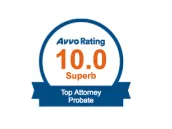Did someone you know and love pass away without leaving a will?
When an individual passes away without establishing a will, this is known as dying “intestate.” A lack of proper planning can complicate the process of distributing an estate. When a person dies without leaving a will, the estate still goes through the probate process. Assets are distributed according to each California county’s intestate succession laws.
Overview of The Probate Process
The first step is to confirm that there isn’t a will on file. This needs to be checked with the county court where the decedent was living on the date of death. Once confirmed, a family member or personal representative who stands to receive some portion of the estate will file a petition to open probate. This process includes submitting various paperwork and the death certificate to the court.
Appointment
The court will appoint this person or the closest living relative as the estate administrator, who will be given letters testamentary to act on behalf of the decedent’s estate affairs. This administrator does not need to have any particular legal or probate knowledge but must act reasonably according to the late loved one’s wishes.
Notification
The administrator is responsible for notifying all interested parties of probate court dates. This includes finding and contacting family members, business partners, and those to whom debts may be owed. Posting notices of court dates in a local newspaper is a part of this process.
Inventory
The estate administrator, typically a surviving spouse or child, is responsible for taking inventory of all estate assets. These assets may include real property, real estate, bank accounts, personal property, and debts. The account must be filed with the probate court before any action is taken in distributing the estate.
Executing
According to state law, all claims against the estate, such as creditor claims and debts, must be settled first before any inheritance is distributed. If there aren’t enough cash assets available, items may be sold from the estate to satisfy these balances. These decisions and payments are the responsibility of the appointed administrator.
In cases where no obvious administrator is willing to carry out these duties, the probate court or an attorney may be appointed as administrator.
Distributing
Once the estate has been enumerated, and all debts have been satisfied, the estate’s distribution may occur. The administrator does not get to make inheritance decisions, as may be the case when the decedent has appointed an executor in a last will and testament.
The assets will be distributed evenly among heirs according to intestate succession law. A surviving spouse will receive full ownership of any jointly owned assets such as real estate or bank accounts. If the decedent did not have any children, the spouse would receive all remaining personal assets. When there are surviving children, the personal assets will be distributed evenly among all immediate living relatives, which include all children and the surviving spouse.
If an extended family member believes they should be included in the inheritance, they will have to file claims with the probate court and submit proof that the decedent would have wished for this. This proof may include providing writings or a previous outdated will.
Closing
After all assets are accounted for, debts paid, and inheritances distributed, the administrator will ensure that all of these transactions and accounts are filed with the probate court. Then they will file to close probate.
The entire probate process may take six months to several years to complete, depending on the estate’s complexities.
Legal Assistance
It is wise to seek legal advice when opening probate in the state of California. Probate law is a complex process involving many steps and much paperwork that can be complicated for an unspecialized administrator to complete. Each step of the process requires filings and clearing of probate notes to continue. Hiring a probate attorney ensures that laws are followed carefully and legally.
The Legacy Lawyers desire to help you through every step of the probate process. We specialize in probate law and have proven techniques to ensure that your time in probate is minimized, and the estate benefits are maximized.
You are not responsible for any upfront attorney fees other than the initial filing fee. We receive payment from the estate at the close of probate.
Our goal is to provide you with a stress-free probate experience, leaving you with peace of mind in this challenging time.
If you need assistance opening probate without a will in California, schedule a consultation with the Legacy Lawyers today.




